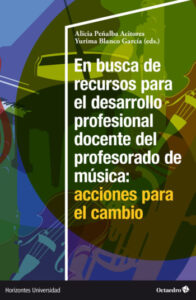What aspects shape music teacher training programs in Spain?
Three members of the PROFMUS project, Felipe Zamorano-Valenzuela, José Luis Aróstegui and Cristina González-Martín, have published an article in the British Journal of Music Education. This joint paper reviews the literature on music teacher education programmes for mainstream education in order to undertake critical reflection on what we are doing and why in our university classrooms, what theories are implicit and what could be done to improve our programmes. After analysis, mainly from European contexts, and considering the Spanish one in particular, the authors find an influence of the economic – and, ultimately, political – rationale on substantial aspects, manifested in apparent disjunctions between musical and educational features, as well as in formal issues, fundamentally due to the European Higher Education Area. In the end, it is concluded that, without renouncing the economic aspects, curricula should be more addressed towards the integration of pedagogical and musical knowledge, and the treatment of aspects related to social justice, if we do not want an uncritical reproduction of rationalities that are often obsolete in the training of pre-service music teachers.
Link to the paper in English: https://www.cambridge.org/core/journals/british-journal-of-music-education/article/economic-rationale-shaping-music-teacher-education-the-case-of-spain/3C4F481DE00BC426B5F5D8B54323DC92
 It consists of five case studies that examine in depth the singularities of in-service training in different contexts. It offers strategies to promote a real transformation in the professional development of music teachers and concludes with three key actions for change: the need for reform in teacher policies, the conjugation of different training models and the importance of a differentiated, heterogeneous and adapted to the reality of teachers’ professional development.
It consists of five case studies that examine in depth the singularities of in-service training in different contexts. It offers strategies to promote a real transformation in the professional development of music teachers and concludes with three key actions for change: the need for reform in teacher policies, the conjugation of different training models and the importance of a differentiated, heterogeneous and adapted to the reality of teachers’ professional development.